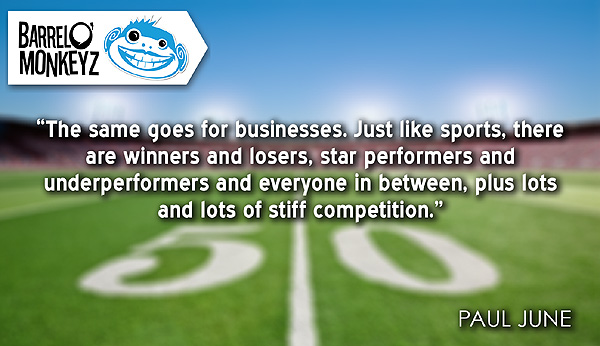When a pro athlete takes the field—whether it’s Aaron Rogers staring down Darrelle Revis, Giancarlo Stanton facing off against Clayton Kershaw, or Serena Williams or Venus Williams going head to head with another tennis elite—each competitor has both the ability and the expectation of achieving success given the talents and track record he or she brings to the table. Sure, all contestants can’t come out on top all of the time, but over time winners establish their ability—their RIGHT—to win consistently.

The same goes for businesses. Just like sports, there are winners and losers, star performers and underperformers and everyone in between, plus lots and lots of stiff competition. In sports as well as in business, from the CEO to the frontline staff, each person comes to the “arena” with a standard set of tools and the acumen necessary to compete. Each comes with the right to win, and they don’t get there by accident. They work hard. They’re good at what they do, and they have to adapt to changing circumstances, rules, and competitive pressures or they don’t stick around for long.
But having the right to win and actually winning are two vastly different things. Just ask any member of the Oakland Raiders football team. Now ask the New England Patriots. Each team has the right to win, but only one wins consistently nowadays.
What’s the difference?
Talent for sure, but in sports just like in business, there’s a fine line between being a star performer and being solid but unspectacular. Desire plays a role, no doubt, as does mental toughness, and having a winning attitude. Such attributes are all part of what one might call a winning team “culture” or, in business, a winning “corporate culture.”
Companies (or teams) that win consistently put themselves, time and again, in situations that give them the greatest right to win. They have the mindset of being winners, and the desire and the talent to do what it takes to get there.
Apple is a good example of a company that has exercised its right to win. All but left for dead after Microsoft surged to the lead in the PC wars of the 1990s, Apple persevered and innovated its way back into contention by the early 2000s. All along, Steve Jobs knew Apple had the right to win; it was all a matter of his company earning the victory . . . and he did so by guiding Apple to out-innovate and outperform its competitors.
Apple achieved success by aligning what it did well and what made it different from other technology companies with a clearly defined target audience, hungry for its products and services. Along the way, Apple was pressured to let others build software for its hardware; it was pressured to let others build hardware for its software; and it was ridiculed for not allowing adobe flash video to play on its smartphones and tablets. But for Apple, winning was all about maintaining control and maintaining the quality of its products in line with customer expectations, all the while adapting to changes in technology and, in many cases, pioneering new technologies. The results speak for themselves.
By holding true to its vision, corporate culture, and underlying principles, Apple has become the most highly-value company in history, at last report nearing the $700 billion mark . . . and that’s a win in anyone’s book.
In sports, this kind of discipline is called focus—the kind of focus necessary to hit a tiny round ball with a thin wooden bat, or for a quarterback to execute under duress as the pocket collapses around him. It’s the kind of focus and drive that separates talented “high potential” athletes from the talented winners.
Which are you—a high potential or a winner?
- Do you align your talents and vision with what your customers want most?
- Do you innovate and adapt to changes in the marketplace?
- Are you able to tell your brand story in a way that makes you stand out from the crowd and connects with your target customers emotionally?
Great Companies Make You Feel.
Remember, like any business you have the RIGHT to win, but so, too do your competitors. How will you stand out? How will you compete?
You can start by working with Barrel O’Monkeyz to tell your brand story in a way that gives your company the greatest right to win.

Trackbacks/Pingbacks